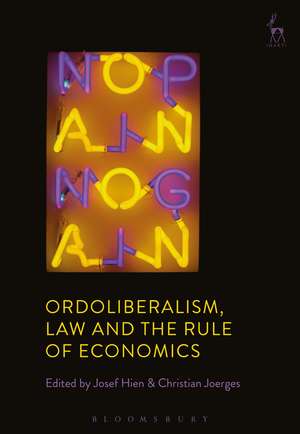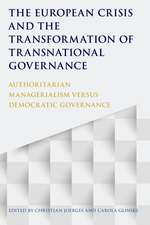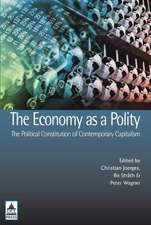Ordoliberalism, Law and the Rule of Economics
Editat de Josef Hien, Christian Joergesen Limba Engleză Paperback – 29 apr 2020
| Toate formatele și edițiile | Preț | Express |
|---|---|---|
| Paperback (1) | 322.41 lei 6-8 săpt. | |
| Bloomsbury Publishing – 29 apr 2020 | 322.41 lei 6-8 săpt. | |
| Hardback (1) | 720.63 lei 6-8 săpt. | |
| Bloomsbury Publishing – 27 dec 2017 | 720.63 lei 6-8 săpt. |
Preț: 322.41 lei
Preț vechi: 392.45 lei
-18% Nou
Puncte Express: 484
Preț estimativ în valută:
61.69€ • 64.42$ • 50.94£
61.69€ • 64.42$ • 50.94£
Carte tipărită la comandă
Livrare economică 15-29 aprilie
Preluare comenzi: 021 569.72.76
Specificații
ISBN-13: 9781509937509
ISBN-10: 1509937501
Pagini: 344
Dimensiuni: 169 x 244 mm
Greutate: 0.54 kg
Editura: Bloomsbury Publishing
Colecția Hart Publishing
Locul publicării:London, United Kingdom
ISBN-10: 1509937501
Pagini: 344
Dimensiuni: 169 x 244 mm
Greutate: 0.54 kg
Editura: Bloomsbury Publishing
Colecția Hart Publishing
Locul publicării:London, United Kingdom
Caracteristici
A timely rexamination of ordoliberalism, a highly influential German political and economic theory regarded as a driving force in the 20th century, now increasingly under scrutiny in the rapidly changing 21st century.
Notă biografică
Josef Hien is Post-Doctoral Fellow at the REScEU project, funded by the European Research Council and hosted at the University of Milan.Christian Joerges is Professor of Law and Society at the Hertie School of Governance in Berlin, and Co-Director of the Centre of European Law and Politics at the University of Bremen.
Cuprins
Introduction: Objectives and Contents of the Volume Josef Hien and Christian JoergesSection I: Irritations/Perceptions of Ordoliberalism and of German Politics1. Dirigisme and Modernism vs Ordoliberalism Bruno Amable2. Why and How has German Ordoliberalism Become a French Issue? Some Aspects about Ordoliberal Thoughts we can Learn from the French Reception Arnaud Lechevalier3. Ordoliberalism's Trans-Atlantic (Un)Intelligibility: From Friedman and Eucken to Geithner and Schäuble William Callison4. The Tepid Reception of Ordoliberalism in Italy and Present-Day Dissent Stefano Solari5. Ordoliberalism as Tradition and as Ideology Kenneth DysonSection II: The Political Liberalism of Ordoliberalism6. Ordoliberalism as a Variety of Neoliberalism Thomas Biebricher7. Breaking the 'Caging' Mentality: Ordoliberalism, Responsibility and Solidarity in the EU Maurizio Ferrera8. What is Neoliberal in Germany's and Europe's Crisis Politics? Brigitte Young9. The Success Story of Ordoliberalism as the Guiding Principle of German Economic Policy Stephan PühringerSection III: The Ordering Functions of Law in the Ordoliberal Tradition10. Debunking the Myth of the Ordoliberal Influence on Post-war European Integration Angela Wigger11. The Overburdening of Law by Ordoliberalism and the Integration Project Christian Joerges12. Ordoliberal Escape from Societas Economica: Re-establishing the Normative Michelle EversonSection IV: The Moral and Normative Dimension of 'the Economic' and the Ordoliberal Tradition13. Ordoliberalism, Polanyi, and the Theodicy of Markets David M. Woodruff14. Ordoliberalism Within and Outside Germany's Co-ordinated Market Economy Albert Weale15. Competition or Conflict? Beyond Traditional Ordoliberalism Malte Dold and Tim Krieger16. Ordoliberalism and the Quest for Sacrality Josef HienSection V: Government without Law17. Ordoliberalism and Political Theology: On the Government of Stateless Money Werner Bonefeld18. Policy Between Rules and Discretion Jonathan White19. How Monetary Rules and Wage Discretion get into Conflict in the Eurozone (And What-If Anything-Ordoliberalism has to do with it) Philip Manow
Recenzii
[T]his is a crucial book if one really wants to understand the evolving debate on the nature, significance and diffusion of Ordoliberalism, beyond and against many, accumulated commonplaces. An even more precious work, if one wants to grasp the shortcomings of the current economic governance of the Eurozone, and what we can expect from a reform of its flawed architecture.











